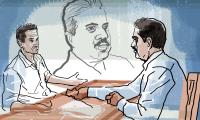In the wake of the massacre of Hindus in Jammu and Kashmir, India asserted on Tuesday that 'more remains to be done' by Pakistan to curb cross-border terrorism and said last year's quake saw the 'public rehabilitation' of terrorist organisations and their involvement in relief work.
"Unfortunately, more remains to be done in curbing the menace of cross-border terrorism. Despite some variations
in infiltration patterns, terrorist training, communications and support continue, waxing and waning with the seasons and
the political climate," Shivshankar Menon, Indian High Commissioner to Pakistan said.
"Worse, the October earthquake has seen the public rehabilitation of terrorist organisations and their involvement in earthquake relief," he said in an address to the Supreme Court Bar Association in Lahore, the text of which was circulated by the Indian High Commission.
Many militant groups including Jamat-ud-Dawa, which was banned by the United States on Friday as a terrorist organisation, were permitted to carry out relief work after the October 8 earthquake. JUD is the renamed version of Lashkar-e-Toiba, which is suspected to be behind the massacre of Hindus in Doda.
Menon said that while considerable sections in Pakistan expressed happiness about Indo-Pak ties, 'official Pakistan, however, sometimes says that India must solve Jammu and Kashmir if other steps are to have meaning or continue'.
"This is extreme and is a partial view. It wrongly assumes that Pakistan has no interest in a broader relationship with India and ignores how confidence building can reinforce the effort to resolve issues," he said.
"To my mind it would be a mistake to bind normalisation of our relations with finding a solution to Kashmir," Menon said. "If we do so, we would hold the benefits available to both our countries from normalisation of relations hostage to the most difficult issue that we face."
"Instead, we should both seek solutions and normalise relations. Let us move step by step, doing much more to create an environment in which we can move forward," he said.
Menon said India has demonstrated its willingness to find 'pragmatic and practical solutions' to resolve the Kashmir problem and cited Prime Minister Manmohan Singh's address on March 24 in Amritsar, where he proposed a treaty of peace, security and friendship.
He said 'meaningful agreements' on Sir Creek and Siachen could be reached 'if all concerned are willing to accept ground realities and take the long view of history and our destiny'.
Menon, however, said both India and Pakistan made big strides in improving relations during the peace process, which began in 2004.
"There has been a sea change in the overall relationship in this period. The atmosphere and range of contacts that exist today between our societies are probably unprecedented," he said.
Listing the ceasefire along the Line of Control and opening of travel links through bus, air and train as major achievements, he said the Indian High Commission in Islamabad issued 10,500 visas for Pakistanis to travel to India, which would be increased considerably once the Indian Consulate in Karachi begins functioning.
The two countries also plan to open bus services between Kargil-Skardu and Poonch-Rawalkot in addition to the Srinagar-Muzaffarabad, Amritsar- Lahore and Amritsar-Nankana Sahib routes, he said.
Complete coverage:








